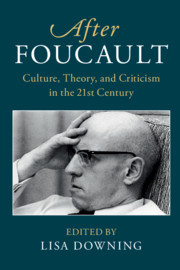Book contents
12 - Foucault and True Crime
from Part III - Reading After Foucault
Published online by Cambridge University Press: 30 May 2018
Summary
When all is said and done, battles simply stamp the mark of history on nameless slaughters, while narrative makes the stuff of history from mere street brawls. The frontier between the two is perpetually crossed. It is crossed in the case of an event of prime interest – murder. Murder is where history and crime intersect.
Foucault, I Pierre Rivière…Crime is glorified, because it is one of the fine arts, because it can be the work only of exceptional natures, because it reveals the monstrousness of the strong and powerful, because villainy is yet another mode of privilege.
Foucault, Discipline and PunishIntroduction: Murder Most Discursive
Murder, one could say, is the opium of modernity. As I explored in my 2013 book, The Subject of Murder, the figure of ‘the criminal’ appears in Foucault's work as one of the quintessential modern subjects produced by the medico-legal and psy disciplines, alongside ‘the homosexual’ and ‘the pervert’. But as well as being as an ‘abnormal’ pathologized personage, the figure of the murderer accrues an attractiveness, a sheen of glamour, and an association with rebellious, Romantic creativity owing to the link between murder and art forged in modernity. For writers such as the Marquis de Sade and Thomas De Quincey, whose work ‘On Murder as a Fine Art’ (1827) Foucault references in the quotation forming the epigraph of this chapter, writing and crime are imbricated as aspects of genius and individuality. And the relationship between writing and crime is precisely what is at stake in this chapter, where I reflect upon the legacy of Foucault's writing on murder for a consideration of the increasingly popular, and increasingly hybrid, twentieth- and twenty-first-century genre of ‘true crime’, a genre that while lending itself to a Foucauldian approach, has not yet been interrogated from this perspective in any substantive or extensive way.
Texts by Foucault that have relatively recently appeared in English for the first time, such as the 2003 Verso collection entitled Abnormal: Lectures at the Collège de France 1974–75, and the documents produced by Foucault's anti-prison group, the GIP (Prisons Information Group), reveal Foucault's enduring interest in the social construction of criminality and the corporeal treatment of those labelled ‘criminals’.
- Type
- Chapter
- Information
- After FoucaultCulture, Theory, and Criticism in the 21st Century, pp. 185 - 200Publisher: Cambridge University PressPrint publication year: 2018

